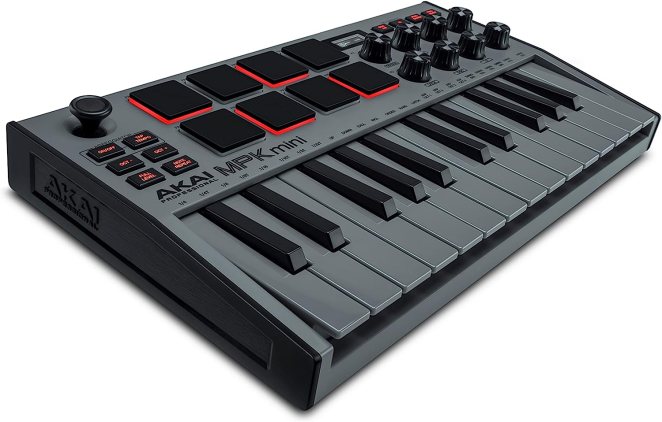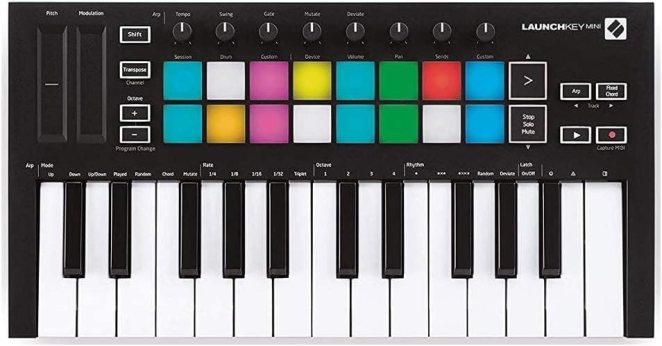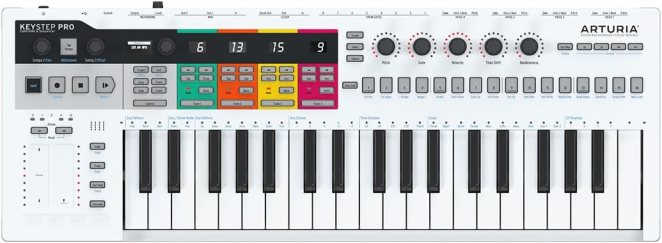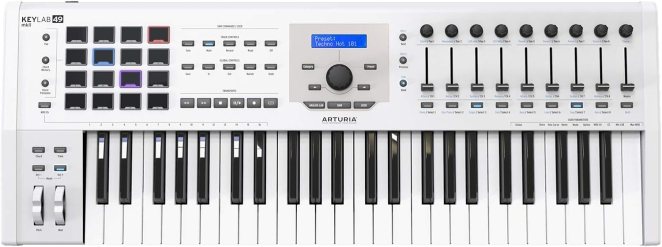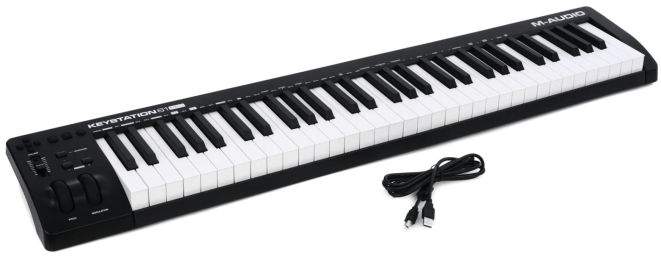Sooner or later, every music producer realizes they need a MIDI keyboard to take their workflow to the next level.
A MIDI keyboard controller is an essential tool if you want to make the most of your virtual instruments and effects; it allows you to bring your musical ideas to life and record them straight away in your DAW. In other words, it's an all-in-one solution to expand your sonic palette and simplify your composition process!
Keyboards for music production come in all shapes and sizes, and choosing one to improve your artistry is no trivial task. So here's a selection of the best MIDI keyboards to make the most of your creative side and digital audio workstation.
In short, if you have the budget, and are serious about your music career, look no further than the NI Komplete Kontrol S88 Mk3: a complete solution for producers of all levels, fully customizable, intuitive, and reliable, which will also give you access to a seemingly endless library of sounds.
For all the other options, keep reading!
Quick Summary of the Best Keyboards for Music Production
- Akai MPK Mini MK3 (Best Portable MIDI Keyboard)
- Novation Launchkey Mini MK3 (Best MIDI Keyboard for Ableton Live)
- KORG microKEY Air-37 (Best Wireless MIDI Keyboard)
- Arturia KeyStep Pro (Best All-in-one portable MIDI controller)
- Arturia KeyLab 49 MKII (Best Customizable MIDI Keyboard)
- M-Audio Keystation 61 MK3 (Best Affordable MIDI Keyboard)
- Native Instruments Komplete Kontrol S88 Mk3 (Best MIDI Keyboard overall)
Best Keyboards for Music Production of 2024
Portable MIDI Keyboard
SPECS:
- Keys: 25 velocity-sensitive mini synth-action keys with Keybed technology.
- Controls: 8 endless rotary knobs, 8 MPC pads with two banks (for a total of 16), 4-way joystick for pitch and modulation control.
- Connectivity: USB, sustain pedal input jack.
- Power: USB powered
- Software: MPC Beats, AIR Hybrid, Mini Grand, Velvet, and six months free of Reason+.
- System compatibility: Windows, Mac, and iOS.
- Other features include an OLED display and a built-in arpeggiator.
The Akai MPK Mini MK3's small footprint makes it the perfect companion for your desktop setup or music-dedicated laptop. It feels sturdy and has a hard construction, so you won't have to worry about carrying it in your backpack all the time.
The eight assignable control knobs can be mapped to control almost any parameter on your DAW, and the MPC pads are backlit and velocity and pressure sensitive providing a precise beat performance with a hands-on production.
The new Gen 2 keybeds in the MPK Mini MK3 deliver a piano key feeling that piano players will certainly enjoy when using virtual instruments. However, the joystick that controls pitch and modulation can sometimes be tricky to direct. You'll need to get used to it if you come from touch strips or wheels.
What Could Be Improved:
- The keys are very small
Best for Ableton
SPECS:
- Keys: 25 mini synth-action keys, velocity sensitive.
- Controls: touch strips for pitch and modulation, eight knobs, 16 RGB backlit velocity-sensitive pads, scene launch, play, record, stop, solo, and mute buttons, octave shift, and transpose.
- Connectivity: USB, 3.5mm TRS MIDI out, sustain input jack.
- Power: USB powered.
- Software: Ableton Live Lite, XLN Audio Addictive Keys, AAS Session Bundle, Spitfire Audio LABS Expressive Strings, Klevgrand R0Verb and Klevgrand DAW Cassette.
- System compatibility: Windows, Mac, and iOS
- Other features: full integration with Ableton Live and standalone operation.
The Novation Launchkey Mini MK3 has one of the best integrations with the Ableton digital audio workstation, which is probably the most popular DAW right now. If you're a new producer, this compact MIDI keyboard includes Ableton Live Lite plus a pack of plugins to get you started immediately.
The Launchkey Mini MK3 includes device macro controls, track select, record, capture MIDI, clip and scene launch, stop, mute, solo, volume, pans, and sends to control Ableton Live directly from the MIDI keyboard.
The arpeggiator in the Launchkey Mini MK3 allows you to control the rhythm, pattern, octaves, and more. The fixed chord feature lets you assign a chord to a key and transpose it up and down as you play.
Finally, the MIDI output lets you operate the Launchkey Mini MK3 as a standalone controller for other hardware, such as synths.
What Could Be Improved:
- MIDI din break-out cables not included.
Best Wireless
SPECS:
- Keys: 37 micro semi-weighted keys.
- Controls: Pitch bend and modulation wheels and octave shift button.
- Connectivity: USB, Bluetooth, switch input jack.
- Power: USB when connected via USB and two AA when connected wirelessly.
- Software: KORG software bundle, Ozone Elements, Skoove.
- System compatibility: Windows, Mac, iOS.
- Other features: Supports Bluetooth Smart “Apple Bluetooth Low Energy MIDI”
The KORG microKEY Air doesn't have as many features as other, more blazoned keyboards, but if you're looking for a no-nonsense MIDI controller, it might be the right one for you.
The pitch and modulation wheels are smooth and expressive and come with octave shift buttons to jump up and down scales. The switch jack allows for a sustain or damper pedal and is great for live-looping performers.
Now, let's talk about why I included it in this list: the wireless control. The KORG microKEY Air has low latency from the Bluetooth connection, and you can also adjust the buffer size if you have high latency. The microKEY Air is fully portable and can also work on AA batteries for the KORG Gadget, KORG Module, and GarageBand for iPad and iPhone.
What Could Be Improved:
- It'd be nice to have an arpeggiator like in the microKEY Air-25.
Best All-in-one
SPECS:
- Keys: 37 slim synth-action keys, velocity sensitive and aftertouch.
- Controls: 4 independent polyphonic sequencer tracks, touch-sensitive pitch bend, modulation, and looper strips, five rotary knobs, and 16-step buttons.
- Connectivity: USB, 4 CV, Gate and Mod outputs, eight dedicated drum Gate outputs, Clocks, MIDI in, 2 MIDI outputs, metronome output, sustain pedal input.
- Power: USB
- Software: Analog Lab Intro, Ableton Live Lite.
- System compatibility: Windows, Mac, and iOS.
- Other features: OLED display and LED-illuminated controls
The KeyStep Pro impressed me because it can run multiple arpeggiators and sequences simultaneously, which makes it perfect for fine-tuning arrangements. With four independent tracks, the KeyStep Pro is a versatile tool that can work magnificently in the studio and on stage.
The first track can operate in two modes, either as a sequencer or a drum, while the other three tracks can operate in sequencer and arpeggiator modes. The mute and solo buttons for each track make it easy to switch between tracks during your arrangement process.
Another impressive feature of the KeyStep Pro is its real-time recording capability, allowing you to record as you play. You can create up to 16 64-step sequences, and recording your sequences is a breeze with the record, stop, and play buttons. If you want precise and ready-for-publication recordings, simply use the shift + record button to turn on quantize, and you're done!
What Could Be Improved:
- The size is too compact to fit everything.
Most Customizable
SPECS:
- Keys: 49 full-sized velocity-sensitive synth-action keys with aftertouch.
- Controls: 9 rotary knobs, nine faders, 16 backlit RGB performance pads, pitch bend, and modulation wheels.
- Connectivity: USB, sustain, expression, three assignable auxiliary pedal inputs, MIDI in/out, CV, and Gate outputs.
- Power: USB and DC power supply.
- Software: Analog Lab V, Ableton Live Lite, and Piano V.
- System compatibility: Windows and Mac.
- Other features: dedicated DAW and transport controls, LCD screen Analog Lab remote, and pre-mapped knobs and faders.
The full-sized velocity-sensitive keys in the KeyLab 49 MKII provide a pro-feel and more natural piano performance than other MIDI keyboards. In terms of built quality, it's heavy and sturdy, and the quality and smoothness of the knobs and sliders are very comfortable.
Within the Analog Lab mode, you can access and browse among the 2000 synth sounds and select your sounds and presets from the KeyLab 49 MKII, giving you total control over your sound palette and musical ideas.
It comes bundled with Ableton Live Lite but is compatible with all major DAWs, including FL Studio, Logic Pro, Pro Tools, and more. The DAW Commands section features six magnetic overlays, with information about what each button controls on different DAWs.
What Could Be Improved:
- The keys are more synth action-oriented than semi-weighted, but they are still better than the Micro and MiniLab versions.
- It's heavier than it looks.
Most Affordable
SPECS:
- Keys: 61 semi-weighted full-sized velocity-sensitive keys.
- Controls: Pitchbend and modulation wheels, Transport, octave shift, volume fader, and directional controls.
- Connectivity: USB, sustain pedal, 5-pin MIDI output.
- Power: USB and DC power supply.
- Software: Ableton Live Lite and MPC Beats, AIR Music Tech Mini Grand, Velvet, Xpand!2, TubeSynth, Electric and Bassline virtual instruments, Skoove, Melodics, and Touch Loops.
- Other features: iOS connectivity with the Apple Lightning to USB Camera Adapter
The M-Audio Keystation 61 MK3 allows you to perform smoothly thanks to the semi-weighted keys' natural feel when playing virtual instruments. Plus, the modulation and pitch bend wheels are designed ergonomically and perform professionally, even in live settings.
The Transport and directional buttons let you control your recording software or DAW, and the fader provides deeper control for your plugins. The advanced functionality of the Keystation 61 MK3 enables customization of the fader, buttons, pitch, and mod wheels to control more parameters from your DAW and plugins.
The M-Audio Keystation 61 fits any setup, from small desks to big studios and live stages. It's an affordable option if you want a compact full-sized keyboard and are looking for a no-nonsense keyboard with no extra knobs, pads, and sliders.
What Could Be Improved:
- The build quality leaves something to be desired
Best MIDI Keyboard Overall
SPECS:
- Keys: 88 fully weighted hammer-action velocity-sensitive keys with aftertouch.
- Controls: Pitchbend and Mod Wheel, touch strip, eight pre-mapped encoders.
- Connectivity: USB-C, sustain, expression, and two assignable pedal inputs, MIDI in and out.
- Power: USB-C powered.
- Software: Kontakt 7, Komplete 14 Select, Komplete Kontrol, a voucher for any NI Kontakt instrument of your choice, iZotope Elements Suite, Ableton Live Lite, Hypha, Guitar Rig 7 LE, and Stradivari Cello.
- System compatibility: Windows and Mac.
- Other features include a full-color glass display, software integration with Kontakt, and MIDI 2.0.
The Native Instruments Komplete Kontrol S88 is compatible with most DAWs, and allows you to record and mix from the keyboard and view every channel from your project on the built-in screen. It connects to your computer and DAW with USB-C and offers MIDI in and out, plus TRS pedal inputs.
The S88 features a Chord Mode to create chord progressions using single keys and an Easy Mode that maps the white keys to a specific scale. Scales and modes are visible with an intelligent Light Guide that highlights drum cells, key switches, chords, scales, and more.
The Native Instruments Komplete Kontrol S88 is made of premium materials, including a glass screen, touch-sensitive anodized aluminum encoders, and metal-touch pitch and mod wheels.
All in all, this is a keyboard aimed at piano professionals or producers who want to upgrade their current setup with advanced and realistic keys.
What Could Be Improved:
- It's not cheap
Buyer’s Guide
Even for those who've been making music for years, the number of MIDI keyboards available right now can be overwhelming!
Here are a few factors to consider when buying MIDI keyboards.
Keyboard Type
MIDI keyboards are often defined by the number and size of their keys. There are portable mini keyboards, which usually have 25 mini keys in mini size, larger keyboard controllers with 37 and 49 keys, which also feature mini or slim keys and full-sized keyboards with 61 to 88 standard-sized keys like the ones on real pianos.
[See more of the best MIDI keyboards here]
It's important to decide on the number of keys you need for your music production needs. Will you prefer a 25 keys mini keyboard with extra knobs or the 61 - 88 keys to use both hands for expressive playing? You can find MIDI keyboards with 25, 49, 61, and or 88 keys, with variations in some models that include a few extra or fewer keys.
If you want to choose the right one for your music production, you'll have to think about your requirements: if you're a beatmaker, a portable controller might be right for you. If you're a classical piano composer, you'll definitely need an 88-key keyboard.
Connectivity
USB is the most common connectivity. Some will also offer USB-powered connections and pedal inputs. Depending on your needs, you should look for other things, such as Bluetooth connectivity or CV outs.
Software Compatibility
Most MIDI keyboards are compatible with major DAWs, such as Ableton Live, FL Studio, Pro Tools, Logic Pro, etc. They come bundled with software that ranges from a DAW trial or lite version to virtual instruments, plugins, and more.
There are certain keyboards that come pre-mapped for certain DAWs, so make sure you check their compatibility and read forums to learn more about hands-on experiences.
Action and Sensitivity
The keys and pads are classified in terms of action and sensitivity, and their weights refer to the force required to press the keys when compared to a real acoustic piano. Some MIDI keyboards feature fully weighted or semi-weighted keys to simulate the feeling of playing on a piano, usually in keyboards with 61 and 88 keys.
Other keyboards feature synth-action keys to resemble the non-weighted feel of synthesizers. The smaller keyboards with 25 to 49 keys are synth-action keys.
Pads can also be velocity-sensitive to the pressure and speed at which they're pressed to trigger drum samples or play beats.
FAQ
What is the difference between weighted, semi-weighted, and synth-action keys?
Weighted and semi-weighted keys resemble real grand pianos' feel and hammer mechanism and are most common in keyboards with 61 and 88 keys. The synth-action key keyboard plays more like the analog synth and drums machines.
What connectivity options should I look for in a music production keyboard?
USB connectivity is all you need as a beginner. However, you can also consider pedal inputs and the MIDI ins and outs to control other analog hardware and live performances. CV and Gate outs are another feature that seasoned music producers look for.
Can I use this keyboard with my current DAW and other music software?
Most MIDI keyboards and controllers are compatible with major DAWs and come with a lite version or free trial of a DAW to use in case you don't already have one.
Are there any keyboards with integrated features like arpeggiators or sequencers?
Yes. MIDI keyboards like Arturia’s KeyStep line feature integrated sequencers and arpeggiators.
How do I decide between a MIDI controller, synthesizer, and digital piano?
Synthesizers and digital pianos can be used as MIDI if they have MIDI output or USB connectivity. However, their options and software integration are limited compared to a dedicated MIDI controller.
Digital pianos usually only offer a few instrument sounds, drum kits and synthesizers to produce music with the keyboard. A MIDI controller can control your audio recording software, virtual instruments, and analog hardware like synthesizers and drum machines.
If you don't mind the lack of knobs, faders, and other features in a MIDI controller, you can opt for a digital piano or synthesizer.
Are there keyboards suitable for both studio and live performance use?
Yes, you can connect a digital piano with MIDI to your computer for studio recording and then use it with the regular output for live performance. There are also MIDI keyboards with MIDI outputs that can be used live. Finally, you can use your MIDI keyboard connected to your computer and audio interface for the outputs to use it live.
Final Thoughts
Choosing the best MIDI controller keyboard for music production is not hard if you follow our buying guide and clearly define what you need to create music. It's important to look for what you need and what fits your budget; for example, you might need an 88-key keyboard to produce orchestral music, but not for electronic music production.
To summarize, if you can afford it, go for the Native Instruments Komplete Kontrol S88 Mk3: it'll revolutionize your workflow and enhance your creativity unlike any other keyboard. For those into affordable MIDI keyboards, the Arturia KeyStep Pro is a powerful and portable controller that gives you everything you need to get started or make music on the go.
If you're starting in music production, think if you need the knobs and faders that some models include, software compatibility and integration, and the space you have in your studio. You can repeat the process and use this guide for future upgrades once you discover what you need and lack from your current MIDI keyboard.
Good luck!
